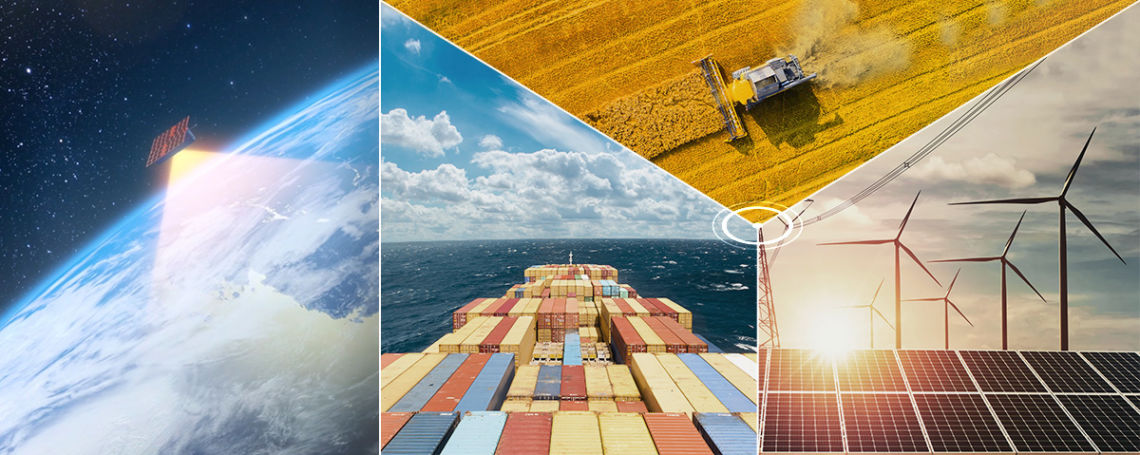Astrocast launches bidirectional satellite IoT service
- February 9, 2022
- Steve Rogerson

Swiss firm Astrocast has launched a commercially available bidirectional satellite IoT service to connect IoT devices globally when outside cell-based terrestrial networks at a comparable cost.
Accessibility to the service could transform the business model for global IoT, opening the door to a raft of applications that can accelerate change and deliver tangible value to business, individuals and the environment.
Using its own recently launched nanosatellite constellation in low Earth orbit (LEO), Astrocast supports applications in asset tracking, telemetry and telematics, as it fosters innovation across sectors including maritime, agriculture, livestock, environment, utilities, land, transport, freight, storage, mining, and oil and gas. By default, IoT devices implemented in many of these situations are deployed in remote locations from mines to farmland, ships to oil platforms. The service reduces the need for human intervention and repair, wherever possible.
In any remote IoT deployment, device size, power consumption and reliability are priorities. Astrocast’s small-sized devices offer low power consumption and a battery life up to ten years. These considerations become vital as organisations deploy a satellite IoT initiative. Just by combining quality battery technology with an intelligent approach to data transmission, the lifecycle of an IoT installation can be extended.
The devices only transmit data when satellites are in range, instead of continuously. This increases battery life, especially in applications that do not require constant information updates. In addition, this reduces the price of data for end users.
Bidirectional IoT has a significant role. The ability to send commands back to assets, rather than just receive data, enables new use cases, including remote management of equipment. For example, it lets farmers command silos to release food, open gates or manage irrigation systems, without any human interaction.
Utilities can remotely control water management systems in line with flood prevention strategies. With information seamlessly integrated with existing analytics, AI or machine learning, organisations have the power to use these data to improve understanding and enable direct actions for remote assets.
“So far, organisations have struggled to create a business case for deploying IoT that can offer comprehensive global coverage, as well as efficient and reliable connectivity,” said Fabien Jordan, CEO of Astrocast. “There is now an opportunity to use satellite IoT to increase visibility, transparency and control over assets globally, and the potential for use cases across an array of sectors is almost limitless. What is more, in the past, these have been too complex, costly or simply unavailable. But, thanks to developments in satellite IoT technology, this is changing; and organisations that recognise the potential of going beyond terrestrial IoT will be able to create new competitive advantages too.”
For example, in New Zealand there is a drive to track cattle remotely to identify individual animals that are unwell, allowing immediate intervention and removal from the herd, to reduce the spread of disease and, in the process, reduce the need for medication. The ability to capture and analyse this information rapidly through satellite IoT not only fast tracks adoption, but also provides rapid insights into the success of the approach.
“Even at-risk animals are playing a role in combatting climate change,” said Jordan. “Using tiny sensors attached to an array of sea creatures, including turtles, is not just providing scientists insight into the behaviour and travel patterns of the animals, but is also capturing vital information regarding sea health, including salinity. From mapping sea temperatures to the depth turtles are swimming, to capturing information about sea water quality, the information provided by these creatures is automatically transmitted via satellite IoT as they surface.”
Astrocast’s integration partners include Airbus, Thuraya, European Space Agency, Wayra and Telefonica. Projects Astrocast has been involved in include International Committee of the Red Cross supporting wildfire detection, animal tracking, water monitoring and vehicle monitoring; and wildlife computers enabling wildlife tracking and biodiversity management.
Founded in 2014, Astrocast designs, builds and tests all its products in-house, from the satellites to the terminals.




